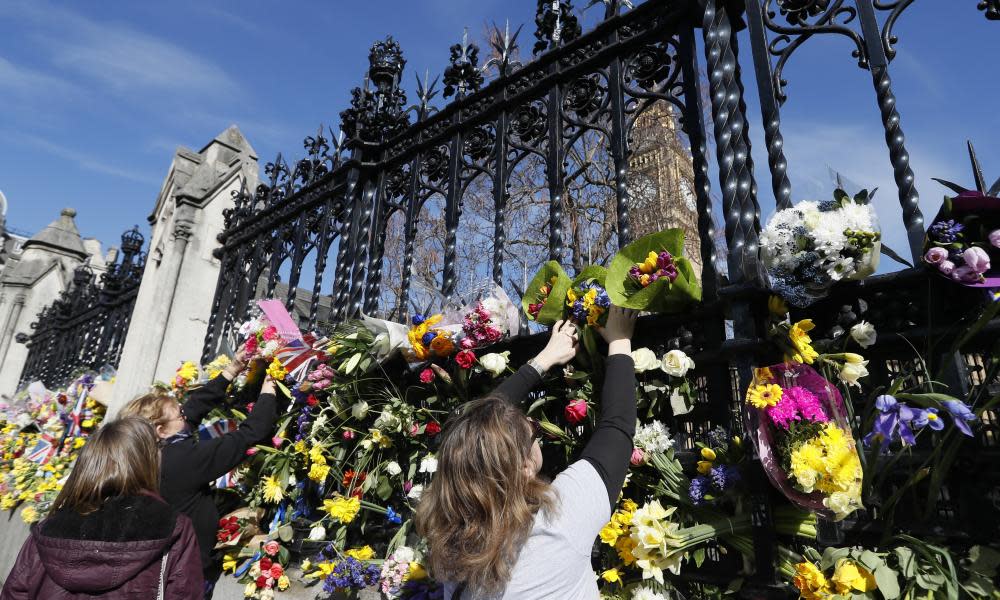Westminster attacker acted alone and motive may never be known, say police

Police investigating the Westminster attack have concluded that Khalid Masood acted entirely alone for reasons that may never be known.
In the most detailed breakdown yet of events on Westminster Bridge and parliament on Wednesday, police said that the entire attack, in which Masood had killed four people before being shot dead, lasted a mere 82 seconds.
After four days of intensive inquiries across England and Wales, involving hundreds of officers, the Metropolitan police said they had so far failed to establish the reason for the attack. It is continuing to look at whether Masood was prompted by online propaganda by Islamic State, which has claimed he was a “soldier”, or whether he had some other sense of grievance.
But deputy assistant Metropolitan police commissioner Neil Basu said: “We still believe that Masood acted alone on the day and there is no information or intelligence to suggest there are further attacks planned.”
The security services do not like the term “lone wolf”, feeling that it glamorises an attacker, and instead prefer “lone actor”. Although 11 people were arrested in the aftermath of the attack, nine have since been released, with no further action to be taken. A 58-year-old man arrested in Birmingham remained in custody on Saturday while a 32-year-old woman from Manchester has been released on bail.
Police are investigating media reports that Masood checked his encrypted messaging service WhatsApp – or even sent a message – just before the attack, which hinted at others being involved. The police statement confirming that he was a lone actor does not appear to support suggestions that he had been in touch with an accomplice.
Basu, who is the senior national coordinator for UK counter-terrorism policing, said: “Even if he acted alone in the preparation, we need to establish with absolute clarity why he did these unspeakable acts to bring reassurance to Londoners, and to provide answers and closure for the families of those killed and the victims and survivors of this atrocity.
“We must all accept that there is a possibility we will never understand why he did this. That understanding may have died with him.”
The police, having reconstructed the attack, said it had begun at 14:40:08 when Masood’s hire car mounted the pavement on Westminster Bridge, weaving along the footpath and road until 14:40:38 when he crashed into the perimeter fence of the Palace of Westminster.
He left the car at 14:40:51 and was shot by a police firearms officer, part of the close protection team of the defence secretary Sir Michael Fallon, in the palace courtyard at 14:41:30.
At 14:40:59, the first 999 call was made to the Met reporting the incident.
Basu said the investigation was continuing and appealed for anyone who had spoken to Masood in recent months, especially in the days leading up to the attack, to contact the police. They are still trying to establish whether he had been “inspired by terrorist propaganda or if others have encouraged, supported or directed him. If the latter proves to be the case, they will face justice.”
He praised the way London and communities throughout the rest of the country had come together and that there had been no backlash.
“The way that communities in London, and throughout the UK, have come together in the wake of this attack shows that we will not give in to those who seek to breed discord and fear,” Basu said.
“Terrorists have tried to tear this city apart before and they have never succeeded. A very small minority of people have tried to use this as an opportunity to stir up hate, but once again we stand together in calm defiance. We will not allow them to divide us.”
As the police and security services piece together Masood’s background, the Saudi Arabian government confirmed that he had worked in the country as an English teacher between 2005 and 2009. It is common for converts to Islam such as Masood to seek work in Saudi Arabia.
Fifteen people are still being treated in hospital.

 Yahoo News
Yahoo News 